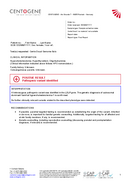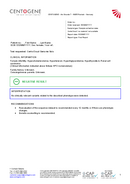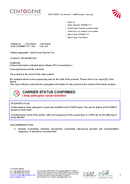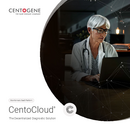Episode 6
CentoCloud® – Medical Reporting
Comprehensive, best-in-class clinical interpretation and reporting validated by our experienced medical experts.
By choosing CentoCloud, our clinical decision support platform, you now have the option to add on to your bioinformatic analysis with a physician-ready, easy-to-interpret report of diagnostic findings.
Listen to our Audio Guide for Episode 6 – Medical Reporting
Advanced Medical Insights
Our optional reporting offer enables any Next Generation Sequencing (NGS) laboratory to generate state-of-the-art comprehensive medical reports that capture up-to-date scientific knowledge, our clinical expertise, and unique insights, which are all based on our rare and neurodegenerative disease-centric Biodatabank.
Transparency and Quality of Medical Reports
High-quality reporting is key to building a partnership of trust. Over the past >15 years, CENTOGENE has been pioneering the path to advanced diagnostic testing – providing patients and physicians comprehensive answers they can trust. CentoCloud’s extensive medical reports contain thorough expert interpretation of clinical data and individualized medical recommendations and differential diagnostic approaches, as well as detailed interpretation of key findings along with actionable results.
KEY FEATURES OF OUR MEDICAL REPORTS
- Detailed evaluation of patients and family history
- Detailed description of the genetic testing methods
- Clear results of identified variants following international best-practice guidelines (ACMG)1,2
- Comprehensive medical interpretation with differential diagnostic approaches if applicable
- References to publications supporting the medical and scientific results
- Recommendations for follow-up analyses for specific diseases
Elements of Our Reports
Our reports contain genetic findings explained in 5 segments:
- Main Findings
Findings with a strong correlation to the patient's phenotype. Summary with clinical information, comprehensive medical interpretation, and recommendations - Potentially Relevant Findings
Variants with partial overlap with the informed phenotype - Research Findings*
Variants in genes with no or only partial experimental evidence for their involvement in human disease, if there are no main findings - Secondary Findings*
Variants in genes according to ACMG guidelines - Carriership Findings*
Variants in >2,000 genes for AR and X-linked early onset, severe diseases
*optional if consent is given (only for WES/WGS)
How Are Variants Classified?
New variants that potentially cause diseases are identified every year – highlighting the need for a clear, consistent, and reproducible classification system. We follow international best-practice ACMG guidelines to improve the understanding of their pathogenicity. Those define five classes regarding a Mendelian variant: pathogenic, likely pathogenic, uncertain significance, likely benign, and benign.1,2 These classes are assigned based on information in publicly available databases as well as the CENTOGENE Biodatabank, following ACMG guidelines.3
Variants are reported if current medical literature and/or internal evidence supports an increased disease risk associated with the variant. Frequency of the variant, in silico predictions, conservation and published data with clinical information, segregation data or functional analyses, among other types of data, must all be evaluated to classify variants according to the best available knowledge at the time of reporting.

The 5 Main Variant Classes (ACMG)
| Class | Properties | Diagnosis | Part of a diagnostic report? |
|---|---|---|---|
| Pathogenic variant = class 1 | Considered as causative based on reported evidence | Genetic diagnosis can be established | yes |
| Likely pathogenic variant = class 2 | Previously unreported, but expected to cause the disorder | Genetic diagnosis is likely | |
| Variant of uncertain significance (VUS) = class 3 | Not enough evidence for / against causality | Genetic diagnosis can not be established | (yes) |
| Likely benign variant = class 4 | Reported / expected not to cause the disorder | Genetic diagnosis can not be established | no |
| Benign variant = class 5 | |||
"Likely" means greater than 90% certainty of a variant either being disease-causing or benign (arbitrary definition)3 | |||
Analysis Reevaluation and Variant Reclassification
At CENTOGENE, we have a life-long commitment to our patients. All diagnostic results from our analyses are automatically entered into our variant reclassification program. This program supports the identification of new genetic evidence. As knowledge on variant frequencies and annotations dramatically increases every year, we systematically evaluate the medical literature for reports of new disease-causing variants and reevaluate past classifications in a case-specific manner as an important step towards improving our understanding of disease pathogenicity. We notify physicians automatically and free of charge if a new classification has an impact on a previous diagnosis.
We notify physicians automatically and free-of-charge if a new classification has an impact on the interpretation in a previously issued report from CENTOGENE.
- Proactive and free-of-charge notification for every patient affected by reclassification
- Systematic updates based on identification of new genetic evidence
- Stringent data curation and validation process
- Most reclassified variants are Variants of Uncertain Significance (VUS)
Secondary Findings
Secondary Findings may be discovered unintentionally and are unrelated to the current medical condition the test was chosen for. If requested by the clinician (consent given), we also provide information on gene variants not associated with the patient’s disease or symptoms, but that are medically actionable. In such cases, we report the gene variants along with any available potential treatment information. We report variants in selected genes according to ACMG guidelines.1,2
Carriership Findings in Index Patients
To ensure that we are offering the most comprehensive medical solutions, we provide an optional, free-of-charge Carriership Finding section for index patients within our WGS and WES reports. In this section, we report pathogenic and likely pathogenic sequence variants in known genes associated with severe and early-onset autosomal recessive and X-linked disorders regardless of their incidence. Such variants usually don't appreciably affect a patient's health; however, they are clinically relevant for reproductive planning. We only report sequence variants that are classified as pathogenic and likely pathogenic in the CENTOGENE Biodatabank. To find out more about Carriership Findings, please visit our carriership findings page.
Sample Reports

CentoCloud Genome Solo – Sample Report Positive
POSITIVE RESULT

CentoCloud Genome Solo – Sample Report Negative
NEGATIVE RESULT

CentoCloud Exome Trio – Sample Report Positive
CARRIER STATUS CONFIRMED – Likely pathogenic variant identified

CentoCloud – Technical Sheet
Technical Specifications about sequencing platforms, library kits and data files
CentoCloud – Delivering Life-Changing Answers
As the essential biodata life science partner for rare and neurodegenerative diseases, CENTOGENE has a lifelong commitment to providing solutions that go beyond the basics. With our medical report add-on, you can rest assured that you are choosing the most thorough diagnostic overview – combining up-to-date scientific knowledge, our clinical expertise, and unique insights.
With CentoCloud’s reporting service, you aren’t just providing information – you’re delivering life-changing answers.
Contact us today Discover episode 1 Discover episode 2 Discover episode 3 Discover episode 4 Discover episode 5

References
1 Miller, D.T., Lee, K., Gordon, A.S. et al. Recommendations for reporting of secondary findings in clinical exome and genome sequencing, 2021 update: a policy statement of the American College of Medical Genetics and Genomics (ACMG). Genet Med (2021). doi.org/10.1038/s41436-021-01171-4
2 Miller, D.T., Lee, K., Chung, W.K. et al. ACMG SF v3.0 list for reporting of secondary findings in clinical exome and genome sequencing: a policy statement of the American College of Medical Genetics and Genomics (ACMG). Genet Med (2021). doi.org/10.1038/s41436-021-01172-3
3 Richards S, Aziz N, Bale S, Bick D, Das S, Gastier-Foster J, Grody WW, Hegde M, Lyon E, Spector E, Voelkerding K, Rehm HL; ACMG Laboratory Quality Assurance Committee. Standards and guidelines for the interpretation of sequence variants: a joint consensus recommendation of the American College of Medical Genetics and Genomics and the Association for Molecular Pathology. Genet Med. 2015 May;17(5):405-24. doi: 10.1038/gim.2015.30. Epub 2015 Mar 5. PMID: 25741868; PMCID: PMC4544753.
